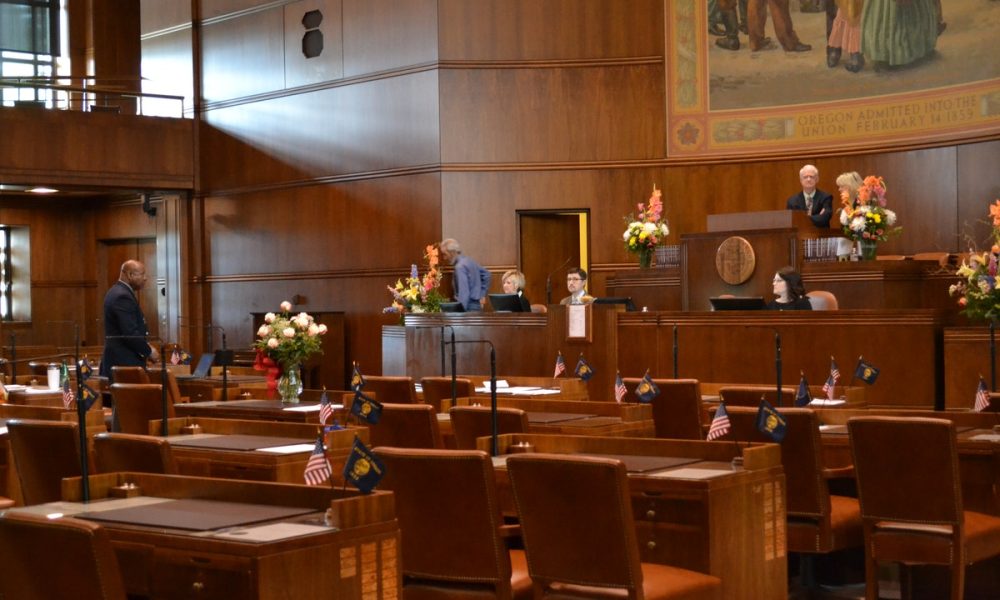
Senate President Peter Courtney goes through motions of convening the Senate on Thursday, June 20, after Republican senators made good on their plan to abandon the Capitol. (Claire Withycombe/Oregon Capital Bureau)
SALEM — Oregon Gov. Kate Brown Thursday called on the Oregon State Police to round up Republican senators absent from the Capitol to protest a major environmental policy.
The state Senate came to a standstill Thursday morning after the chamber’s 11 Republicans didn’t show.
It’s the second time Senate Republicans have used their absence to convey their displeasure over a policy proposed by Democrats, who hold claim to the governor’s mansion and majorities in each chamber of the Legislature.
The Senate has 18 Democrats, all of whom were present Thursday. But it needs 20 members to legally meet — at least two Republicans if all Democrats are present.
“It is absolutely unacceptable that the Senate Republicans would turn their back on their constituents who they are honor-bound to represent here in this building,” the governor said in a statement. “They need to return and do the jobs they were elected to do.”
Senate President Peter Courtney, D-Salem, gave a sorrowful speech during a Thursday floor session after the sergeant-at-arms was unable to locate two more senators in the Capitol.
“I hope the sadness in my voice is as loud as the volume,” Courtney said.
In a letter hand-delivered by his staff to the governor, Courtney said the state’s Constitution and Senate rules say the Senate can “compel the attendance of absent members to establish a quorum.”
“The Oregon Department of Justice advises that the Oregon State Police, at the direction of the governor, may assist the sergeant-at-arms by returning absent members,” Courtney wrote.
“I am thankful to you and the Oregon State Police for helping the Oregon Legislature complete its constitutional responsibilities by ensuring that the legislative branch can continue to operate for the citizens of Oregon,” Courtney wrote.
Brown quickly sprang into action, giving the go-ahead verbally to OSP Superintendent Travis Hampton.
“After many hours of well-intentioned, respectful negotiations on Wednesday, the Senate has come to an impasse,” Brown said in a statement. “The Senate Republicans have decided to abandon their duty to serve their constituents and walk out. The Senate Democrats have requested the assistance of the Oregon State Police to bring back their colleagues to finish the work they committed to push forward for Oregonians.”
Sen. Michael Dembrow, D-Portland, who led the committee developing the proposal that prompted Republicans to bolt, wasn’t surprised by the walkout.
He thinks Republicans had reached a point of no return after a tense couple of days.
On Wednesday, loggers and truckers showed up at the Capitol in full force to protest the bill, which they fear could decimate the state’s timber industry.
“It seems like this was a slow-motion train wreck,” Dembrow said.
But if Republicans are out of the state, not even the state police can return them.
Sen. Cliff Bentz, R-Ontario, said early Thursday he was on his way to Idaho.
Bentz has worked extensively to change House Bill 2020, the cap-and-trade proposal. But since December, he has been shut out of conversations about the bill, he said.
When the May walkout ended, part of the agreement was a “reset” on cap and trade.
Bentz said that never happened, so the Republican agreement to remain in the building was void.
“They essentially left us with no choice but to protest the breaking of the agreement,” said Sen. Tim Knopp, R-Bend, who told Oregon Capital Bureau he has left the state as well, although he declined to say where he was.
The specifics of the so-called reset aren’t clear. In May, several lawmakers, including Baertschiger, couldn’t outline exactly what that meant.
On Thursday, Bentz referred the Oregon Capital Bureau to Baertschiger on what the reset exactly entailed, but he reiterated he didn’t feel there had been a good faith effort by Democrats.
Bentz has been pushing for the “lion’s share” of the money generated by the expansive environmental program to go to moving Oregonians into electric vehicles. He also wants the program to be softer on industry.
He said he repeatedly lobbied Dembrow and Courtney without success.
In a last-ditch effort, Bentz spent Wednesday negotiating with Rep. Karin Power, D-Milwaukie, and Gov. Kate Brown’s chief of staff, Nik Blosser.
Power designed the bill with Dembrow and the two of them lead the joint committee that crafted House Bill 2020.
Meetings started at about 10 a.m. Wednesday in a conference room off of Brown’s ceremonial office at the Capitol.
Power and Bentz went back and forth as Blosser mediated. Brown poked her head in periodically. At one point, former Sen. Chris Edwards joined for about an hour and a half. Edwards is a lobbyist for the timber industry, but as a lawmaker, he championed similar climate legislation.
The group broke at about 7:30 p.m., and an hour later, Blosser called Bentz to tell him there was no deal. Bentz was asking for the same sort of changes he pitched to Dembrow and Courtney, he said.
“It wasn’t for a lack of trying,” Bentz said.
Bentz has a good rapport with Blosser. The two worked extensively on a transportation package two years ago. He commended the governor’s staff for working so hard to find a compromise, but without one, the only choice was to leave the state, he said.
“This is a bridge too far, and it’s dangerous for Oregon,” Bentz said of cap-and-trade. “I’m not doing this for show.”
Dembrow didn’t agree that Bentz has been frozen out of talks over the cap-and-trade proposal.
He said he made a list of about a dozen of Bentz’s priorities that have been added into the bill, including easing the transition to electric vehicles and helping Oregonians adapt to the new program.
But in the end, Bentz wanted more changes than Dembrow and other Democrats are willing to give.
“I think he is still pitching just some very radical changes to the bill,” Dembrow said.
As of Thursday morning, Brown was no longer negotiating the bill itself — at this point, it’s between Senate Democrats and Republicans.
Senate Republican Leader Herman Baertschiger, Jr., said in a statement before Thursday’s floor session that the legislation should be referred to voters.
“Protesting cap and trade by walking out today represents our constituency and exactly how we should be doing our job,” said Baertschiger. “We have endured threats of arrest, fines, and pulling community project funds from the governor, Senate president and majority leader. We will not stand by and be bullied by the majority party any longer.”
Brown met with Baertschiger Wednesday, but not to negotiate the cap-and-trade legislation. One of the loggers at the Capitol Wednesday to protest House Bill 2020 asked to meet with Brown and she agreed.
Baertschiger joined the meeting, but the discussion stuck to the possible impact of House Bill 2020 on the logging industry.
“Oregonians are hard workers,” said Sen. Ginny Burdick, D-Portland, who leads Democrats in the Senate. “Whether we are rural or urban we show up to work every day to do the job we are paid to do.”
Burdick said the walkout “is a slap in the face to all hard-working Oregonians, particularly to those in their districts.”
In addition to an annual salary, lawmakers receive a per diem payment of $149 while the legislature is in session. During their last walkout, in May, Republicans who were absent still received their per diem.
However, the Senate is fining absent members $500 per day starting Friday.
“The taxpayers are paying them to a job for their constituents and they are not doing that job,” Burdick continued. “Yet, they are collecting their salaries and per diem payments for not doing their jobs. This is not the example we should set for our children.”
As part of a deal to bring Republicans back the first time, Democrats agreed to drop two bills: one tightening vaccine requirements for public school attendance and another increasing restrictions on gun ownership.
Those bills are back under consideration, Senate Democrats say.
It’s unusual, but not unprecedented, for the governor to dispatch the state police to round up absent lawmakers.
The last time it happened was 2007, when then-Gov. Ted Kulongoski ordered police to bring Roger Beyer, a Republican senator from Molalla who was attending a baseball game in Corvallis with a fellow senator.
At the time, Democrats held 19 seats in the Senate, meaning they only needed one Republican to hold a vote.
Beyer, who is now a lobbyist, said he was surprised when state troopers showed up to take him to Salem, since he believed he’d been excused for the day and wasn’t expected to vote. But he agreed to go with them back to Salem.
“We were just getting ready to get in the car,” Beyer said, when the police got a call from Salem telling them Beyer’s presence wasn’t needed after all.
The Oregonian reported at the time that Kulongoski asked police to tell Beyer and Sen. Frank Morse, who was also in Corvallis, “to enjoy the game and have a hot dog for me.”
Beyer said throughout the encounter, the troopers were “very courteous and very accommodating.”
Jim Moore, a political science professor at Pacific University and director of the Tom McCall Center for Policy Innovation, noted that in Oregon’s history, both Democrats and Republicans have stopped work by refusing to show up.
Aside from the 2007 incident, which was averted relatively quickly when then-Senate Minority Leader Ted Ferrioli agreed to show up for the vote, the most recent work stoppage took place in 2001, when House Democrats walked out to stop Republicans from passing a redistricting plan.
The tactic has also been used in other states, perhaps most notoriously in 2011, when Wisconsin and Indiana Democratic legislators fled to Illinois to prevent Republicans from approving new limits on labor unions.
This is the first time in recent memory that Oregon lawmakers have mounted two boycotts in the same session.
“It’s well within the rules, but it seems to be ignoring the will of the people writ large,” Moore said. “You’re in effect slapping the face of the people who did not vote for you in your district, and you’re ignoring the fact that statewide, your party lost.”
As a political tactic, however, it has some merit.
Moore said Democrats agreeing to shelve gun control and vaccine mandate bills in exchange for Republicans’ cooperation last month was a “pretty minor” concession, but if Republicans think they can extract more from Democrats this time, they have an incentive to hold out until Brown and Courtney give in.
“Just like the first time,” Moore said, “It’s: ‘So what are you going to get out of this?’”
YOUR SUBSCRIPTION WOULD HELP — Salem Reporter relies almost exclusively on reader subscriptions to fund its operations. For $10 a month, you hire our entire news team to work for you all month digging out the news of Salem and state government. You get breaking news alerts, emailed newsletters and around-the-clock access to our stories. We depend on subscribers to pay for in-depth, accurate news. Help us grow and get better with your subscription. Sign up HERE.









